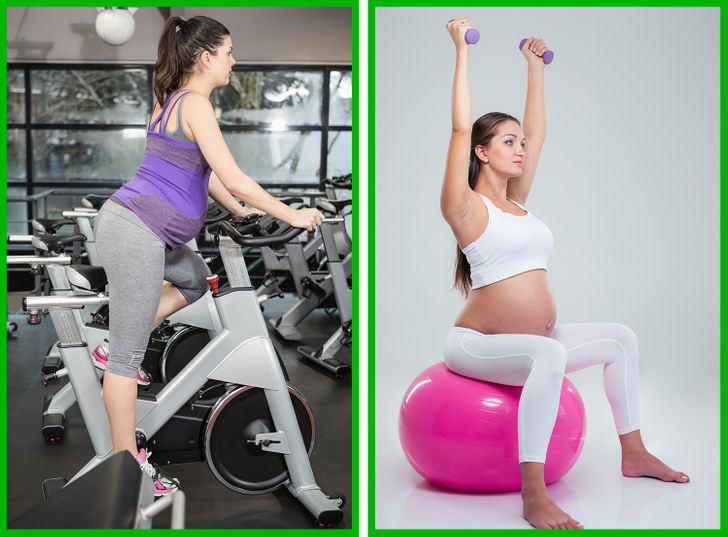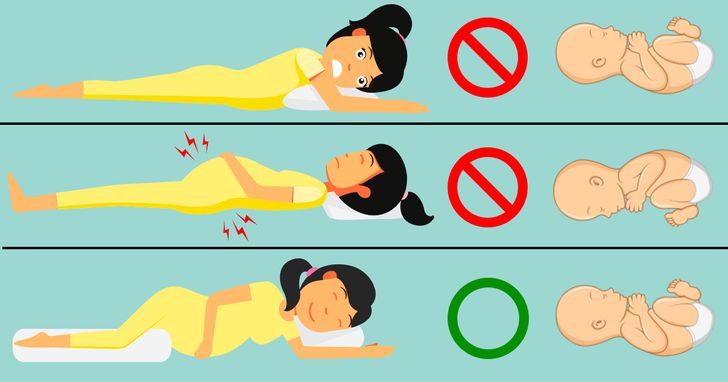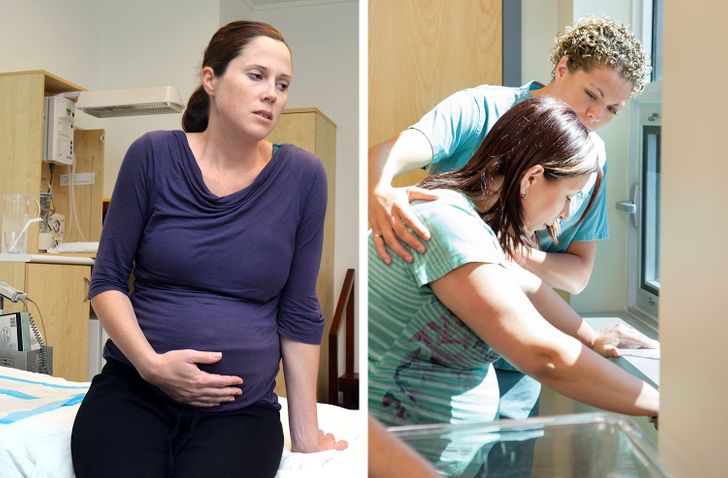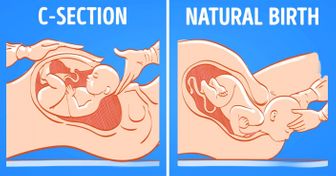This is exactly what I needed to see now that I am pregnant. It is very informative. Thank you Bright Side
8 Things Every Woman Should Learn About Before Giving Birth
Pregnancy is the start of a new life. But it goes without saying that there is a lot a future mother needs to research and ask her doctor about in order to deliver a healthy baby. From sleeping positions to dieting and exercise, there is a lot at risk for the new mother and the baby. Keep reading to find out what a pregnant woman should discuss with her doctor.
Remember to talk to your doctor or medical provider before making changes to your health plans.
1. Prenatal care

Right after a woman has confirmed with her doctor that she is becoming a mother, it’s vital that she does her own research and chooses a gynecologist that she believes suits her best. The gynecologist will then inform her on how to carry on with a healthy pregnancy without any complications and schedule monthly check-ups to make sure that everything is going according to plan.
This way, she will make sure that both her health and the unborn child’s is good, and they will also be able to identify any developmental disorders that may occur at an early stage and prepare accordingly.
The gynecologist will be able to inform her about how her body will change during the first month of her pregnancy and how the fetus is developing. Some gynecologists will prescribe prenatal vitamins, such as folic acid, which prevents neural tube defects and ensures a healthy delivery.
2. Learn about your family history and possible inheritable diseases.

Apart from wondering about the obvious, like if the baby will inherit their mom’s blue eyes or their dad’s brown hair, parents should realize that the baby can inherit much more than these things. It’s important, even before planning, for both parties to research the family history to give to their baby the healthiest start to life possible. Every parent should know if there is a history of developmental disabilities, birth defects, or genetic diseases in the family that the baby will likely inherit.
Having that sort of knowledge, parents will be able to address those problems at an early stage. Based on that history, the gynecologists will then refer the parents to genetic counseling followed by genetic testing to help identify possible health issues that the baby might have.
3. Foods to eat and avoid before giving birth

The phrase “eating for 2” is accurate when it comes to pregnancy but not in the sense of twice as much food but rather, twice as many nutrients vitamins and minerals. A diet high in iron, calcium, folic acid, and protein is vital as well as some extra calories to ensure that both the mother and the baby are getting all the healthy nutritious food that is required during pregnancy.
It is important to keep in mind that a pregnant woman requires more vitamins and minerals and sometimes supplements cannot compete in any way with a healthy diet. Poor eating habits can increase the risk of gestational diabetes and can lead to health complications during delivery.
4. Find out what exercises are safe to do while pregnant.

Exercising every day can ensure the normal functioning of a pregnant woman’s changing body. Since childbirth requires a lot of physical strength and energy it is a must during pregnancy. Staying active can reduce the risk of complications during pregnancy as well as delivery. Even if a mother is not physically active before pregnancy she can start while pregnant. Physical activity can help reduce the discomforts that accompany pregnancy and they help build muscle strength to reduce pregnancy and delivery pain.

Exercises to do:
- Choose aerobic activities that can help your heart beat faster, such as walking, swimming, and dancing.
- Do muscle-strengthening activities at least 2 days a week.
- Make sure you breathe while you exercise.

Exercises to avoid:
- Avoid exercises that require you to lie on your back.
- Avoid exercises that can cause you to fall.
- Avoid engaging in any type of sport that can cause you to get injured in the belly.
NOTE: It is important, however, for pregnant women to consult with their doctors about the types of exercises they need to do during pregnancy and which types of exercises they need to avoid since they can put both their health and that of their baby at risk.
5. Learn about the most suitable sleeping positions.

Tiredness and exhaustion are very common during pregnancy, especially during the first 12 weeks, and there are some sleeping positions that can be dangerous as the pregnancy progresses. According to the National Health Service, the safest sleeping position is on your side.
According to research, sleeping on your back after the 28th week of pregnancy can increase the risk of stillbirth. This is because the position limits the blood flow and oxygen provided to the baby. If you wake up on your back you can change your position and sleep on your side. You can also try pregnancy pillows, which you can place between your legs, that can prevent you from rolling over and sleeping on your back.
6. Learn about the benefits of Yoga and self-care
There is no denying that being pregnant can be emotionally and physically stressful. Taking care of a new life inside your body means that whatever you are going through, the baby goes through. So, it’s important to take care of yourself as much as you can and avoid unpleasant situations or situations that make you feel stressed.
According to the National Institute of Health, yoga offers a variety of health benefits to both the body and the mind, especially when it comes to pregnancy, such as:
- It helps you manage the stress that is accompanied by pregnancy.
- It helps you prevent many diseases that can occur during pregnancy. For example, edema, diabetes, or gestational hypertension.
- It improves mood stability.
- It helps eliminate aches.
- It prevents excess weight gain.
- It reduces the amount of anxiety your body goes through during labor.
7. Learn about the Antenatal Transition
The antenatal period is the transition to parenthood, and it happens while a woman is still pregnant, from conception until birth. During this period, both parents go through significant psychological and social changes while they are trying to understand how to adapt to their new roles as parents, and the stress increases as the due date approaches.
Parents who are expecting twins or triplets go through more stress than parents who are expecting just one child. This is because they have double or triple responsibilities to cover. In addition, they require more time off to recover from giving birth and need more help from their spouses and family members. Sometimes, this can cause a lot of stress for both parents right before giving birth as they try to figure out how to handle it all.
Most couples find it hard to communicate with each other during this time without realizing it, but according to experts, this is completely normal. After the baby is born, the stress is eliminated little by little, and most couples bounce back to normal in their roles as new parents.
If you experience these changes in your relationship, it is important to understand that what you and your partner are going through is completely normal and that the stress is because you can’t understand what it will be like to be a parent yet. But once your baby is born, you’ll see that everything will come naturally and the stress will be gone.
8. Learn about labor and delivery

Labor is a very emotional experience that requires strong psychological and physical coping mechanisms. However, it is important to consult your gynecologist in order to understand the signs and symptoms of going into labor. The most obvious sign of labor is the frequent contractions that increase in pain and duration as time progresses.
It is extremely important for mothers to be in constant communication with their doctor both before and after delivering their baby and speak to their doctor about any concerns or issues they might have. Always consult your doctor about dieting, exercise, and any activity can harm the baby which might not be very obvious.
Comments
wow
I Google for content about pregnant ladies this afternoon and came across your excellent website, https://brightside.me/inspiration-family-and-kids/8-things-every-woman-should-learn-about-before-giving-birth-647460/
I want to congratulate you for providing amazing content and adding value to your readers.
We recently published an article on pregnancy https://childprotectlife.blogspot.com/2023/01/Foods-during-pregnancy.html. It covers important information for readers.
I will be grateful If you add my blog post link to your page, as it will benefit your readers a lot.
I wish you all the best and have a good day.
Talk soon,
faique
Related Reads
We Are Debunking 11 Pregnancy Myths to Help All Mothers-to-Be

13 Celebrities Who Chose to Become Moms Later in Life

17 People That Changed So Much They Can Barely Recognize Themselves in the Mirror

An Artist Draws Comics About Girls’ Everyday Lives That Every Girl Can Relate To

An Israeli Artist and His Wife Won the Hearts of Millions With Honest Comics About What It’s Like to Wait for a Baby

20+ Honestly Gorgeous Wedding Dresses That Will Make You Want Them Too

10+ Times Someone’s Ordinary Day Turned into Something Special

10+ Real Events That Turned Into a Chapter of a Horror Story

I Can’t Believe What My Ex-Husband Asked Our Daughter to Do

14 Times a Cheating Partner Got Busted in the Most Abrupt Way

I Banned My MIL From Our House After Overhearing What She Told My Husband

I Can’t Believe What My Fiancé Wants to Do With MY Inheritance

